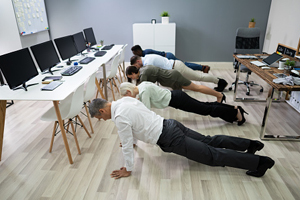
"Field Notes" is a regular AACRAO Connect column covering practical and philosophical issues facing higher education professionals. The columns are authored by various AACRAO members. If you have an idea for a column and would like to contribute, please send an email to the editor at connect@aacrao.org.
by Jennifer Brackett, Assistant Registrar, Notre Dame
As I sit here in my home office with a soda at the ready and fresh cookies coming out of the oven, it is hard to think, “Focus on your core.” The idea of core exercises makes me shiver. Yet, there is a lot to be said for "core
work" -- at least as it applies to the core functions of our profession, especially in light of what we’ve all experienced this spring.
As a result of the global COVID19 pandemic, our professional lives have changed. We are now working from home, holding commencement ceremonies online, and the million other things asked of us -- yet in the midst of all of this, we must still (re)focus on the core tenants of our jobs.
Physically, our core helps with strength, balance, and posture. At work, a strong core provides the same: a consistent (strong), fair (balanced), and prepared (poised) office. Self magazine recently listed several exercises to focus on your anatomical
core. In the midst of all that's changed and changing, let’s extrapolate these exercises to our professional lives in order to keep our offices strong and support transitions as painlessly as possible.
Plank - A quick Google search will show that core functions of a Registrar’s office include: registration, class schedules and lists, date/term calendar management, and a permanent record of grades. Sounds a lot like a plank,
right? A stable base with great form, unwavering execution, which is a foundational building block of what we do.
Butterfly Situp - This one looks like torture for someone who regularly enjoys fresh-out-of-the-oven cookies: a sit-up that forces you to have good form. It eliminates the idea of taking the easy way out.
When we look at what we had to do in the Spring of 2020, and what we may have to do as professionals moving forward, they will require us to have great form. What are the key areas we need to focus on? What are the key things that our students
and customers expect of us? Whatever those things are, there is no room for the ‘little cheats.’ The proper form, done with great execution, will be necessary.
Dead Bug - Think about a bug on its back, struggling mightily to flip over and carry on. We probably looked a lot like this over the course of the spring term: lots of different functions, all doing what we can to keep things moving in the right
direction. Sometimes, those limbs worked in different directions, but they all had the same goal in mind. If a single focus emerges, a single direction, it is much easier to get to that target. All efforts have to be focused on the same thing
to get where we all want to be.
Jack Knife - The semester of the pandemic really did make us all move in a very different direction than we are used to going. Just as a jack knife exercise results in a ‘V’ shape with our bodies, our processes took a sharp-angled turn,
as well. A socially distant, online instruction model with staff working remotely is the opposite direction from where we were headed as our semester began.
The point of the jackknife exercise is to focus all of the core muscle groups and stabilize yourself. As institutions, we had to focus all of our collective efforts, institution-wide, to keep things moving in the right direction, and to stabilize
life for our students and academic communities.
Row the Boat - To get stronger, you hold your body in an unfamiliar position, using muscles you don’t usually use, and twist. Imagine the possibilities, as we stretch ourselves to do things we don’t normally do, yet in so doing make
our institutions stronger at the core.
In the midst of the many ways higher education has and is changing, our focus on the our core responsibilities to our student body, our faculty, and our institutions must be at the forefront.
The exercises listed above, both the actual physical exercise and the metaphorical ones, are difficult, but will ultimately make us, individually and institutionally, more flexible, adaptable, and stronger.